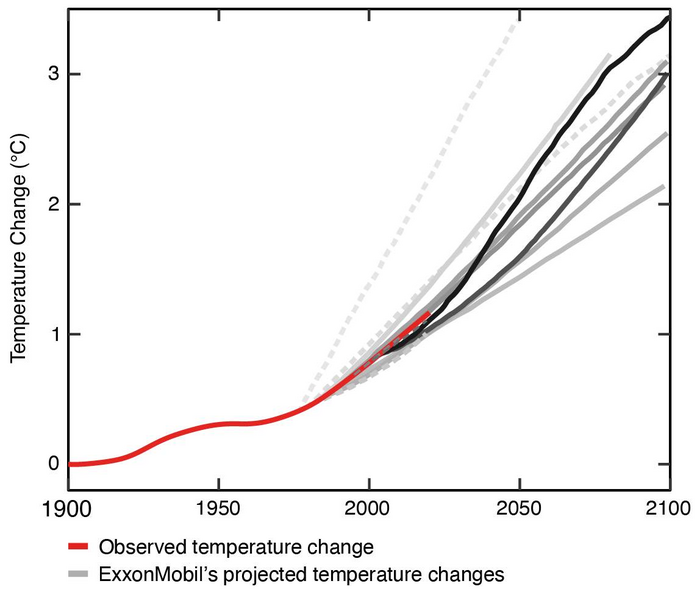According to a new Harvard study, ExxonMobil scientists provided climate projections between 1977 and 2003 that were accurate and proficient at foretelling future global warming and refuted the company’s public statements.
 Summary of all global warming projections reported by ExxonMobil scientists in internal documents and peer-reviewed publications between 1977 and 2003 (gray lines), superimposed on historically observed temperature change (red). Solid gray lines indicate global warming projections modeled by ExxonMobil scientists themselves; dashed gray lines indicate projections internally reproduced by ExxonMobil scientists from third-party sources. Shades of gray scale with model start dates, from earliest (1977: lightest) to latest (2003: darkest). Image Credit: Geoffrey Supran
Summary of all global warming projections reported by ExxonMobil scientists in internal documents and peer-reviewed publications between 1977 and 2003 (gray lines), superimposed on historically observed temperature change (red). Solid gray lines indicate global warming projections modeled by ExxonMobil scientists themselves; dashed gray lines indicate projections internally reproduced by ExxonMobil scientists from third-party sources. Shades of gray scale with model start dates, from earliest (1977: lightest) to latest (2003: darkest). Image Credit: Geoffrey Supran
Researchers at Harvard University and the Potsdam Institute for Climate Impact Research have put a number on what ‘Exxon knew’ about climate science decades ago: that burning fossil fuels would result in 0.20 ± 0.04 °C of global warming per decade. This is the first comprehensive analysis of the climate projections made by the fossil fuel industry.
The conclusions, which were reported in the peer-reviewed journal Science and encapsulated in a single graph showing every global warming projection made by Exxon and ExxonMobil Corp scientists between 1977 and 2003, are based on statistical analyses of never-before-reported data tucked away in the company’s documents.
This study is the first quantitative examination of the company’s early climate science, despite the fact that it has been widely reported that Exxon has been aware of the threat posed by global warming since the 1970s.
Exxon’s conflicting internal and external rhetoric on climate change was the subject of earlier research. This report delves deep into corporate data and shows that the company had startlingly accurate knowledge of how much warming would occur.
The report noted, “We find that most of their projections accurately forecast warming consistent with subsequent observations. Their projections were also consistent with, and at least as skillful as, those of independent academic and government models.”
The study finds that 63–83% of the global warming projections made by ExxonMobil scientists were in line with subsequently recorded temperatures using established IPCC statistical methods. Additionally, ExxonMobil scientists’ projections had an average “skill score” of 72±6%, with the highest score being 99%.
In contrast, the US Congress received global warming forecasts from NASA scientist Dr. James Hansen in 1988, with skill scores ranging from 38% to 66%. After accounting for the discrepancies between predicted and measured atmospheric CO2 levels, ExxonMobil scientists’ projections had a “skill score” of 75±5%, with seven scoring 85% or higher. For comparison, the corresponding skill scores for Hansen’s 1988 projections ranged from 28% to 81%.
The study discovered, “Exxon and ExxonMobil Corp also correctly rejected the prospect of a coming ice age, accurately predicted when human-caused global warming would first be detected, and reasonably estimated the ‘carbon budget’ for holding warming below 2 °C. On each of these points, however, the company’s public statements about climate science contradicted its own scientific data.”
The study lends credence to ongoing ExxonMobil legal and political investigations.
The authors stated, “These findings corroborate and add quantitative precision to assertions by scholars, journalists, lawyers, politicians, and others that ExxonMobil accurately foresaw the threat of human-caused global warming, both prior and parallel to orchestrating lobbying and propaganda campaigns to delay climate action, and refute claims by ExxonMobil Corp and its defenders that these assertions are incorrect.”
Study lead author and Harvard University Research Associate Geoffrey Supran stated, “This is the nail-in-the-coffin of ExxonMobil’s claims that it has been falsely accused of climate malfeasance.”
Our analysis shows that ExxonMobil’s own data contradicted its public statements, which included exaggerating uncertainties, criticizing climate models, mythologizing global cooling, and feigning ignorance about when—or if—human-caused global warming would be measurable, all while staying silent on the threat of stranded fossil fuel assets.
Geoffrey Supran, Lead Author, Research Associate, Harvard University
The research was funded by the Rockefeller Family Fund and Harvard University Faculty Development Funds, according to the study’s Acknowledgments.
Journal Reference:
Supran, G., et al. (2022) Assessing ExxonMobil’s global warming projections. Science. doi:10.1126/science.abk0063.